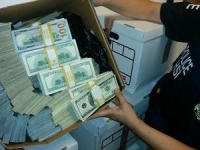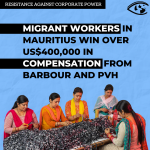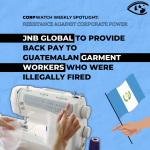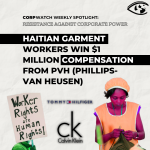Fashion District Businesses Accused of Laundering Mexican Drug Money

One thousand law enforcement officers staged an early morning raid on dozens of businesses in Los Angeles fashion district to seize $65 million allegedly derived from drug trafficking. QT Fashion, a company that imports wholesale maternity wear from China to Mexico, provided a key to the money laundering scheme.
"Unscrupulous companies that help cartels cover their financial tracks by laundering their illicit funds are contributing to the devastation wrought by the international drug trade," Claude Arnold, special agent in charge for Homeland Security Investigations in Los Angeles, said in a press statement.
The U.S. State department estimates that between $19 billion and $29 billion in cash is sent each by drug dealers to Mexico to buy drugs like cocaine.
Essentially the way the system works is as follows: U.S. drug dealers who need to launder large quantities of hard cash they make in clandestine sale give the money to fashion businesses in Los Angeles. The fashion traders accept the money in exchange for exporting clothing to Mexico. The clothing is sold on the Mexican market, generating legal local currency that traders then pay out to Mexican peso brokers who are working for drug cartels.
"Los Angeles has become the epicenter of narco-dollar money laundering with couriers regularly bringing duffel bags and suitcases full of cash to many businesses," Robert Dugdale, an assistant U.S. attorney for the Central District of California, said in a press statement.
The target of the raid was the Sinaloa drug cartel - allegedly the most powerful in the world - which deals in Colombian cocaine, marijuana and methamphetamine from Mexico as well as heroin from Southeast Asia.
The tip-off came when U.S. federal agents seized a 100 kilo cocaine shipment in October 2012 from a drug trafficker. The trafficker was taken hostage, then beaten, electrocuted, shot and waterboarded on a farm in Culiacan, Mexico, by the Sinaloa cartel. The gang directed U.S. relatives of the hostage to pay $140,000 in cash to QT Fashion if they wanted their family member released alive.
Two executives of QT Fashion were arrested in the raid - Andrew Park, and Sang Jun Park. Three other companies have also been named - Gayima Underwear, Pacific Eurotex Corp. and Yili Underwear. Six individuals connected to those companies were also arrested - Xilin Chen, Chuang Chen, Mehran Khalili, Hersel Neman, Morad Neman and Alma Villalobos.
These three businesses number among the 4,000 odd small businesses that make up the $18 billion Los Angeles "fashion district." Most of them do not trade in high end designer items, but rather wholesale imports of clothes from Asia, which are often then re-exported to South America. "The importers bring it into the U.S. from China, and then ship to Mexico," Ilse Metchek, president of the California Fashion Association, told the Los Angeles Times.
Federal investigators also accused Jose Isabel Gomez Arreoloa of working with QT Fashion to replace "Made in China" labels with "Made in USA" tags to avoid Mexican taxes on Chinese imports.
After the raid, the government mailed out orders to dozens of business in the Los Angeles fashion district requiring them to report any transaction greater than $3,000.
"When we go in and do something of this magnitude in an industry where the cartels are so heavily invested, it stops their business. The question is for how long," said Jere Miles, deputy special agent in charge of Immigration and Customs Enforcement .
But experts say that the drug cartels will simply move their business elsewhere. "This is a very agile industry," David Shirk, a University of San Diego professor who has studied Mexican cartels, told the Los Angeles Times.
- 185 Corruption



